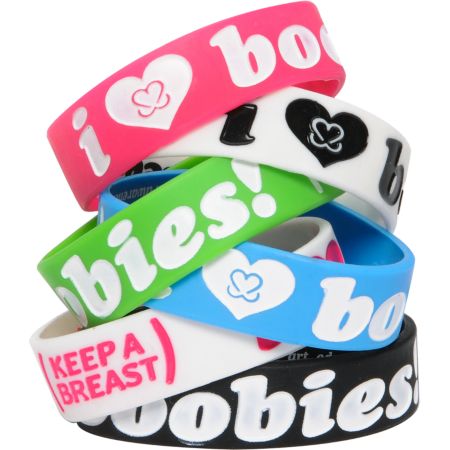
In 2010, Eastern Area Middle School in Pennsylvania suspended several middle school students for wearing the "I (heart) boobies" breast-cancer fundraising bracelets. The students then did what any self-respecting tween with money will do-- took the school district to court, claiming the ban on the trendy wrist-wear violated their freedom of speech. While the federal judge ruled in their favor last year, the school district appealed to the federal circuit court, which recently determined it will hear the case in front of the full 14-judge court.
As a former teacher of young teens (which Science has proven to be the most annoying age EVER), I empathize with the teachers and administrators at this school. There is nothing like delivering a beautifully poetic and painstakingly-rehearsed lesson on the pythagorean theorem, only to be interrupted by a cacophony of giggles and snorts of "haha BOOBS!" Yet, at the same time, it is difficult to tell a teenager who is supporting their mother, sister, aunt, etc. who has battled cancer that their particular form of support may be inappropriate for the classroom.
Regardless of this quandary, which will soon be settled in the federal courts, the situation gives us an opportunity to examine a very problematic media campaign.
The Keep A Breast Foundation, a breast cancer awareness nonprofit in California, introduced the "I (heart) boobies" rubber bracelets in 2004 as part of a strategy to involve younger generations in the fight against breast cancer. With their bright colors and semi-risque phraseology, the bracelets made breast cancer fun and sexy (because what's sexier than a debilitating disease?). Since then, the bracelets have become a fashion craze among teens and tweens across the country.
But at what cost?
While the campaign has successfully reached a previously untapped demographic, it is popular only because it sexualizes a very serious disease and objectifies women’s bodies.
Think of it this way: the bracelets do not say “I (heart) women.” The message is not that women are awesome, that we should concern ourselves with saving women's lives. No, the message is that boobs are awesome, that we should worry about saving boobs. It reduces women's complex lives down to a highly sexualized body part. Consequently, the breast-cancer-battleground shifts from promoting women's health to protecting men's desire to look at, play with, and otherwise enjoy breasts.
If the end goal of breast cancer awareness, education, and research is to improve the health and well-being of women, then this type of outreach is counterintuitive. Sex may sell, but the cost-- reinforcing a system of male gaze and privilege-- is simply too high.
Stylish and popular. The popularity of Silicone Bracelets can work in your favor, since people are more likely to wear these for style as compared to other giveaways your organization may offer them.
ReplyDelete